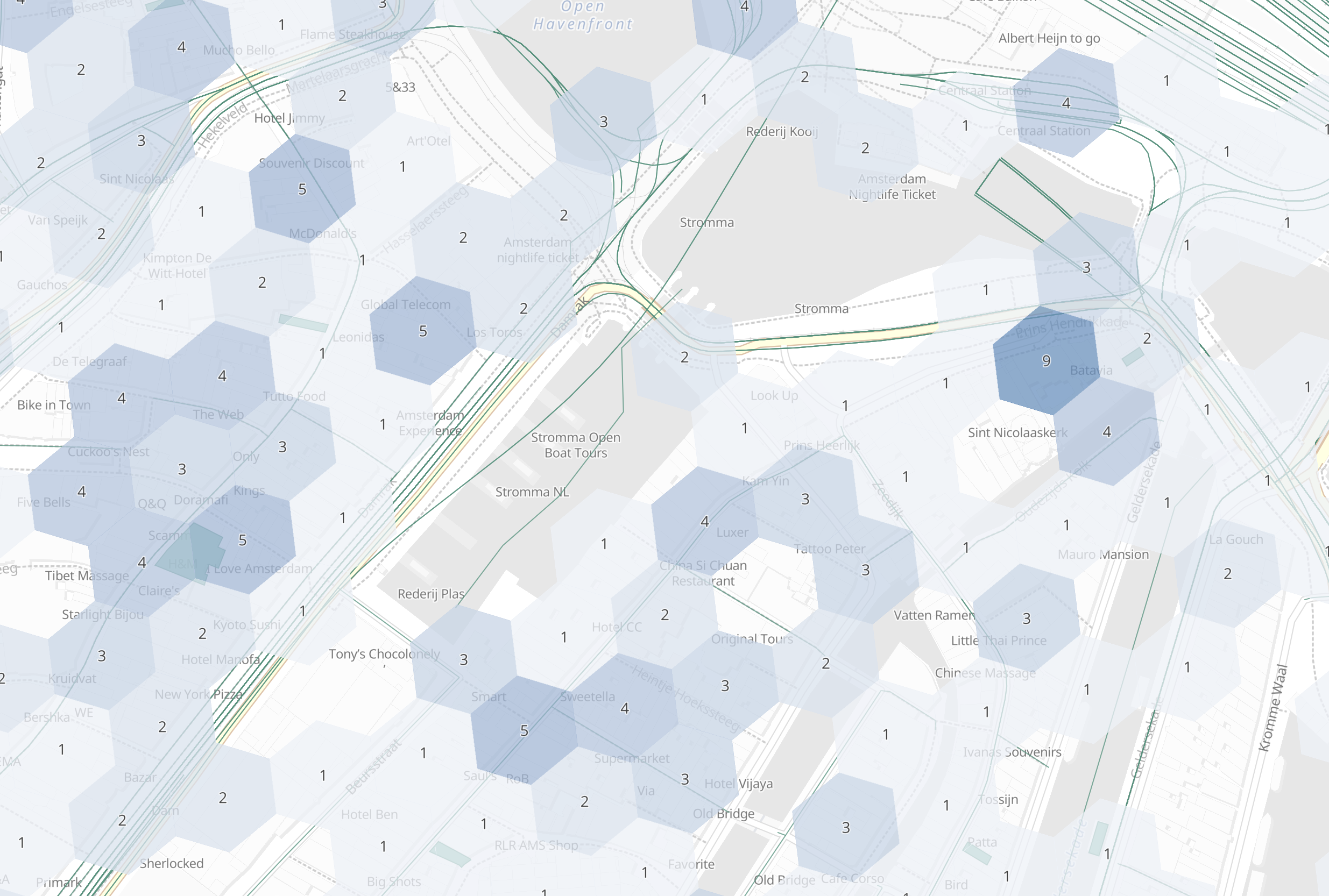Geohex 网格聚合
编辑Geohex 网格聚合
编辑一个多桶聚合,将 geo_point 和 geo_shape 值分组到代表网格的桶中。生成的网格可以是稀疏的,并且仅包含具有匹配数据的单元格。每个单元格对应于一个 H3 单元格索引,并使用 H3Index 表示进行标记。
请参阅 H3 分辨率的单元格面积表,了解精度(缩放)如何与地面上的大小相关联。此聚合的精度可以在 0 到 15 之间(包括 0 和 15)。
高精度请求在 RAM 和结果大小方面可能非常昂贵。例如,精度为 15 的最高精度 geohex 生成的单元格覆盖面积小于一平方米。我们建议您使用过滤器将高精度请求限制在较小的地理区域内。有关示例,请参阅 高精度请求。
简单的低精度请求
编辑resp = client.indices.create( index="museums", mappings={ "properties": { "location": { "type": "geo_point" } } }, ) print(resp) resp1 = client.bulk( index="museums", refresh=True, operations=[ { "index": { "_id": 1 } }, { "location": "POINT (4.912350 52.374081)", "name": "NEMO Science Museum" }, { "index": { "_id": 2 } }, { "location": "POINT (4.901618 52.369219)", "name": "Museum Het Rembrandthuis" }, { "index": { "_id": 3 } }, { "location": "POINT (4.914722 52.371667)", "name": "Nederlands Scheepvaartmuseum" }, { "index": { "_id": 4 } }, { "location": "POINT (4.405200 51.222900)", "name": "Letterenhuis" }, { "index": { "_id": 5 } }, { "location": "POINT (2.336389 48.861111)", "name": "Musée du Louvre" }, { "index": { "_id": 6 } }, { "location": "POINT (2.327000 48.860000)", "name": "Musée d'Orsay" } ], ) print(resp1) resp2 = client.search( index="museums", size="0", aggregations={ "large-grid": { "geohex_grid": { "field": "location", "precision": 4 } } }, ) print(resp2)
response = client.indices.create( index: 'museums', body: { mappings: { properties: { location: { type: 'geo_point' } } } } ) puts response response = client.bulk( index: 'museums', refresh: true, body: [ { index: { _id: 1 } }, { location: 'POINT (4.912350 52.374081)', name: 'NEMO Science Museum' }, { index: { _id: 2 } }, { location: 'POINT (4.901618 52.369219)', name: 'Museum Het Rembrandthuis' }, { index: { _id: 3 } }, { location: 'POINT (4.914722 52.371667)', name: 'Nederlands Scheepvaartmuseum' }, { index: { _id: 4 } }, { location: 'POINT (4.405200 51.222900)', name: 'Letterenhuis' }, { index: { _id: 5 } }, { location: 'POINT (2.336389 48.861111)', name: 'Musée du Louvre' }, { index: { _id: 6 } }, { location: 'POINT (2.327000 48.860000)', name: "Musée d'Orsay" } ] ) puts response response = client.search( index: 'museums', size: 0, body: { aggregations: { "large-grid": { geohex_grid: { field: 'location', precision: 4 } } } } ) puts response
const response = await client.indices.create({ index: "museums", mappings: { properties: { location: { type: "geo_point", }, }, }, }); console.log(response); const response1 = await client.bulk({ index: "museums", refresh: "true", operations: [ { index: { _id: 1, }, }, { location: "POINT (4.912350 52.374081)", name: "NEMO Science Museum", }, { index: { _id: 2, }, }, { location: "POINT (4.901618 52.369219)", name: "Museum Het Rembrandthuis", }, { index: { _id: 3, }, }, { location: "POINT (4.914722 52.371667)", name: "Nederlands Scheepvaartmuseum", }, { index: { _id: 4, }, }, { location: "POINT (4.405200 51.222900)", name: "Letterenhuis", }, { index: { _id: 5, }, }, { location: "POINT (2.336389 48.861111)", name: "Musée du Louvre", }, { index: { _id: 6, }, }, { location: "POINT (2.327000 48.860000)", name: "Musée d'Orsay", }, ], }); console.log(response1); const response2 = await client.search({ index: "museums", size: 0, aggregations: { "large-grid": { geohex_grid: { field: "location", precision: 4, }, }, }, }); console.log(response2);
PUT /museums { "mappings": { "properties": { "location": { "type": "geo_point" } } } } POST /museums/_bulk?refresh {"index":{"_id":1}} {"location": "POINT (4.912350 52.374081)", "name": "NEMO Science Museum"} {"index":{"_id":2}} {"location": "POINT (4.901618 52.369219)", "name": "Museum Het Rembrandthuis"} {"index":{"_id":3}} {"location": "POINT (4.914722 52.371667)", "name": "Nederlands Scheepvaartmuseum"} {"index":{"_id":4}} {"location": "POINT (4.405200 51.222900)", "name": "Letterenhuis"} {"index":{"_id":5}} {"location": "POINT (2.336389 48.861111)", "name": "Musée du Louvre"} {"index":{"_id":6}} {"location": "POINT (2.327000 48.860000)", "name": "Musée d'Orsay"} POST /museums/_search?size=0 { "aggregations": { "large-grid": { "geohex_grid": { "field": "location", "precision": 4 } } } }
响应
{ ... "aggregations": { "large-grid": { "buckets": [ { "key": "841969dffffffff", "doc_count": 3 }, { "key": "841fb47ffffffff", "doc_count": 2 }, { "key": "841fa4dffffffff", "doc_count": 1 } ] } } }
高精度请求
编辑当请求详细的桶(通常用于显示“放大”的地图)时,应应用像 geo_bounding_box 这样的过滤器来缩小主题区域。否则,可能会创建并返回数百万个桶。
resp = client.search( index="museums", size="0", aggregations={ "zoomed-in": { "filter": { "geo_bounding_box": { "location": { "top_left": "POINT (4.9 52.4)", "bottom_right": "POINT (5.0 52.3)" } } }, "aggregations": { "zoom1": { "geohex_grid": { "field": "location", "precision": 12 } } } } }, ) print(resp)
const response = await client.search({ index: "museums", size: 0, aggregations: { "zoomed-in": { filter: { geo_bounding_box: { location: { top_left: "POINT (4.9 52.4)", bottom_right: "POINT (5.0 52.3)", }, }, }, aggregations: { zoom1: { geohex_grid: { field: "location", precision: 12, }, }, }, }, }, }); console.log(response);
POST /museums/_search?size=0 { "aggregations": { "zoomed-in": { "filter": { "geo_bounding_box": { "location": { "top_left": "POINT (4.9 52.4)", "bottom_right": "POINT (5.0 52.3)" } } }, "aggregations": { "zoom1": { "geohex_grid": { "field": "location", "precision": 12 } } } } } }
响应
{ ... "aggregations": { "zoomed-in": { "doc_count": 3, "zoom1": { "buckets": [ { "key": "8c1969c9b2617ff", "doc_count": 1 }, { "key": "8c1969526d753ff", "doc_count": 1 }, { "key": "8c1969526d26dff", "doc_count": 1 } ] } } } }
带有额外边界框过滤的请求
编辑geohex_grid 聚合支持一个可选的 bounds 参数,该参数将考虑的单元格限制为与提供的边界相交的单元格。bounds 参数接受与地理边界框查询相同的 边界框格式。此边界框可以与额外的 geo_bounding_box 查询一起使用,也可以不使用额外的 geo_bounding_box 查询来过滤聚合之前的点。它是一个独立的边界框,可以与聚合上下文中定义的任何额外的 geo_bounding_box 查询相交、相等或不相交。
resp = client.search( index="museums", size="0", aggregations={ "tiles-in-bounds": { "geohex_grid": { "field": "location", "precision": 12, "bounds": { "top_left": "POINT (4.9 52.4)", "bottom_right": "POINT (5.0 52.3)" } } } }, ) print(resp)
const response = await client.search({ index: "museums", size: 0, aggregations: { "tiles-in-bounds": { geohex_grid: { field: "location", precision: 12, bounds: { top_left: "POINT (4.9 52.4)", bottom_right: "POINT (5.0 52.3)", }, }, }, }, }); console.log(response);
POST /museums/_search?size=0 { "aggregations": { "tiles-in-bounds": { "geohex_grid": { "field": "location", "precision": 12, "bounds": { "top_left": "POINT (4.9 52.4)", "bottom_right": "POINT (5.0 52.3)" } } } } }
响应
{ ... "aggregations": { "tiles-in-bounds": { "buckets": [ { "key": "8c1969c9b2617ff", "doc_count": 1 }, { "key": "8c1969526d753ff", "doc_count": 1 }, { "key": "8c1969526d26dff", "doc_count": 1 } ] } } }
聚合 geo_shape 字段
编辑对 Geoshape 字段进行聚合的工作方式与对点进行聚合几乎相同。 有两个关键差异:
- 当聚合
geo_point数据时,如果点位于大圆定义的边缘内,则认为点位于六边形瓦片内。换句话说,计算是使用球面坐标完成的。但是,当聚合geo_shape数据时,如果形状位于等矩投影上的直线定义的边缘内,则认为形状位于六边形内。原因是 Elasticsearch 和 Lucene 在索引和搜索时使用等矩投影处理边缘。为了确保搜索结果和聚合结果对齐,我们在聚合中也使用等矩投影。对于大多数数据,差异是细微的或者没有注意到。但是,对于低缩放级别(低精度),尤其是远离赤道的地方,这可能会很明显。例如,如果相同的点数据索引为geo_point和geo_shape,则在较低分辨率下进行聚合时可能会得到不同的结果。 - 与
geotile_grid的情况一样,单个形状可以在多个瓦片中进行计数。如果形状的任何部分与该瓦片相交,则该形状将有助于匹配值的计数。下面是一张演示此情况的图像:

选项
编辑|
field |
(必需,字符串)包含索引的地理坐标点或地理形状值的字段。必须显式映射为 |
|
precision |
(可选,整数)用于定义结果中单元格/桶的键的整数缩放。默认为 |
|
bounds |
(可选,对象)用于过滤每个桶中的地理坐标点或地理形状的边界框。接受与 地理边界框查询 相同的边界框格式。 |
|
size |
(可选,整数)要返回的最大桶数。默认为 10,000。当结果被修剪时,桶的优先级基于它们包含的文档数量。 |
|
shard_size |
(可选,整数)从每个分片返回的桶数。默认为 |